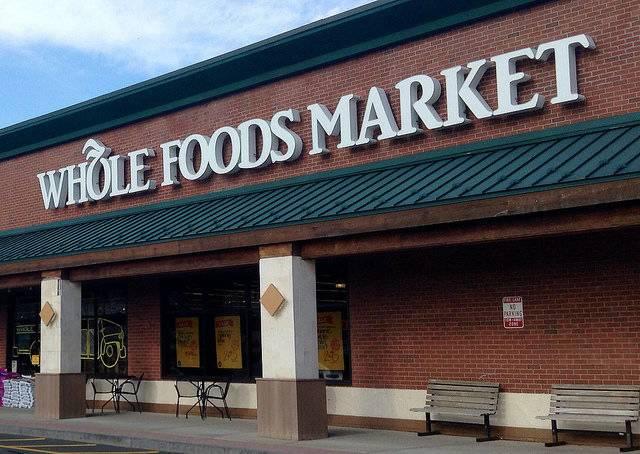
Whole Foods may have made made the organics movement mainstream, but now the company is in deep trouble.
After six consecutive quarters of declining sales, the Austin, Texas-based supermarket chain has been subjected to rumors that it is a target of acquisition, with Kroger, Amazon and private equity firms all mentioned as potential suitors.
The reasons for the chain’s decline are all over the map, but the bottom line is that customers are not walking in as often and not buying as much at the checkout line: Its stock price traded at around $56 a share in early 2015, a price that has since fallen by a third.
In some ways, Whole Foods has become a victim of its own success. “Everyone else has copied Whole Foods,” wrote reporter Vanessa Wong of Buzzfeed.
And that is true to an extent: Whole Foods is largely responsible for transforming the modern grocery store. Austere shelves illuminated by harsh fluorescent lighting gave way to a bucolic “customer experience.” Many grocery store chains have followed the retailer’s lead, eschewing the industrial linoleum for acid-stained concrete floors and softer light. And these same chains have added more organics, additional ethnic foods, and loaded up on once-exotic eats and drinks – while often pricing these products cheaper than Whole Foods.
Whole Foods has faced hiccups before. During the 2008-2009 Great Recession, analysts predicted the company was in for a long, painful slog. “Back then, we told our clients to sell off their Whole Foods shares, as we thought the financial crisis would convince families to shop there less and more often at cheaper stores,” a retired Wells Fargo financial advisor, who declined to be named in this article, told TriplePundit. “Boy, were we wrong.”
Concerns over contaminated food, public health, GMOs and the country’s food supply in general buoyed Whole Foods. The chain did close a few stores during the recession, but it continued to expand. Meanwhile some upstarts, such as Tesco’s Fresh and Easy, came and went.
But while Whole Foods exhorted shoppers to buy its goods in order to change lives from Oaxaca to Zambia, not everyone who worked for the company was feeling the love.
A systematic overcharging scandal only added to the chain’s perception as “Whole Paycheck,” and countless memes mocked the company as an overpriced and self-important hipster emporium. Bizarre product rollouts, such as pre-peeled oranges and asparagus water, helped to pile on the company’s too-cool-for-school reputation. Furthermore, a company that claimed to save consumers from Big Food had its own share of public relations nightmares – most notably revelations that some of the stores’ products were the outcome of prison labor.
Meanwhile, Trader Joe’s, which has less selection but better prices overall, has succeeded luring away more consumers. And Sprouts Farmers Market, which is best described as a hybrid of TJ’s and Whole Foods, is winning over shoppers with its lower prices.
Whole Foods says it is listening. The company is planning a line of simplified and lower-priced 365 stores, named after its private-label products that hold their own compared to their competitors’ costs. So far, only a handful of these new stores have opened; the location in the gentrified Silver Lake area of Los Angeles is reportedly doing well a year after opening its doors. A new location in Houston, however, was put on hold as of Monday. And say farewell to any aggressive expansion strategy: The company’s once-ambitious plan to open 1,200 stores nationwide has been curtailed, Bloomberg reported earlier this year.
While the outlook is a grim one for Whole Foods' shareholders, executives and, of course, employees, overall health-conscious consumers are the big winners as organic foods become more accessible and cheaper. But now Whole Foods no longer has a stranglehold on what was once a niche market; like other retailers, the company will have to retool and adapt to fickle consumers’ shifting loyalties if it hopes to be viable in the long run.
Image credit: Mike Mozart/Flickr

Leon Kaye has written for 3p since 2010 and become executive editor in 2018. His previous work includes writing for the Guardian as well as other online and print publications. In addition, he's worked in sales executive roles within technology and financial research companies, as well as for a public relations firm, for which he consulted with one of the globe’s leading sustainability initiatives. Currently living in Central California, he’s traveled to 70-plus countries and has lived and worked in South Korea, the United Arab Emirates and Uruguay.
Leon’s an alum of Fresno State, the University of Maryland, Baltimore County and the University of Southern California's Marshall Business School. He enjoys traveling abroad as well as exploring California’s Central Coast and the Sierra Nevadas.














